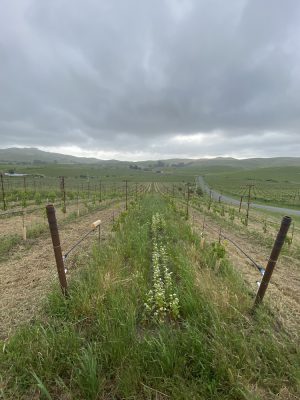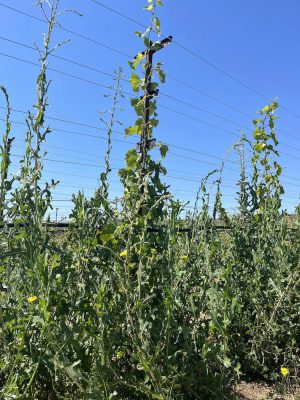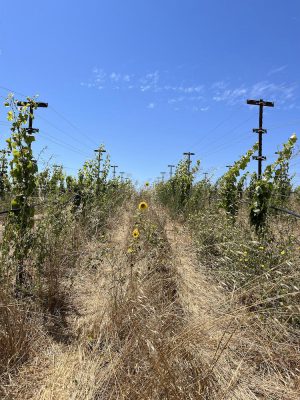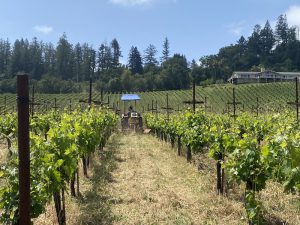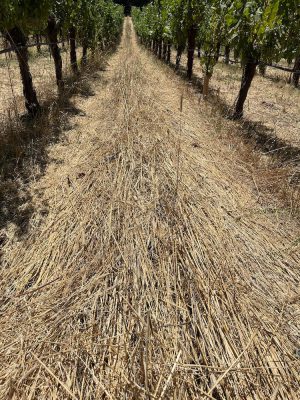Grgich Hills Estate – Growing Vineyard Health, ROI, and Welcoming Companion Plants
As with sustainability, building a regenerative farm system is a journey, not a destination. Grgich Hills Estate has been on this journey for more than 20 years, and when you stand in their vineyards you see and feel the difference. As Ben Mackie, our Vineyard Program Manager, noted, “If you’re a bug or a bird, you want to be living in these vineyards.” Not only that, but Grgich has been collecting the data and making the case for the economics of regenerative, organic farming. Ivo Jeramaz, Winemaker and Vice President of Vineyards & Production, says,
Regenerative practices are a proactive approach to farm health. If you’re healthy enough you don’t get sick – you’re able to fight off disease and pests.
Ivo notes that perhaps the biggest challenge, or benefit, of shifting to truly regenerative farming is that it requires a “paradigm shift.”
Social Sustainability: Let’s start with the foundation – social sustainability. As part of achieving the new(ish) Regenerative Organic Certification, Grgich increased the hourly rate for their vineyard stewards to $23/hour. The stewards went from 60 hrs/wk with no overtime to 40 hrs/week with overtime. Grgich has a year-round crew of 45 people that they hire from a vineyard management company. “The vineyard team feels valued, is happier, and more motivated,” says Ivo. “Productivity has doubled or tripled. Even with rising supply chain costs our overall costs are only up 3-4% over the past few years.” As we stress at Napa Green, this is the ROI of investing in your team, not just in terms of a living wage but also training, opportunity, empowerment.
Companion Plants: Part of Grgich’s paradigm shift has been ceasing to see weeds and instead “companion plants.” In Grgich vineyards they build up about 2’ of cover around the vines and bring in the sheep, who eat voraciously. Ivo stresses, “It’s important not to keep the sheep in one area for too long. They’ll overgraze the cover crop and compact the soil. We want to keep ground cover year-round.” Grgich only mows the vineyard alleys, using a Twister undervine, and they’ve seen the benefits of soil water retention by eliminating tillage.
In terms of disease, 35-40% of vines in their Yountville old vine vineyards have leafroll, but their yield and quality remain on par with the Napa Valley average. In an average rainfall year, the 65 year old Yountville vineyard is producing 3.7 tons/acre and their 20 y/o vineyard averages 4.3 tons/acre. “Our regenerative practices are like a vaccine,” notes Ivo. “You only have to worry about red leaf if your vines and ecosystem are weakened.” Similarly, despite 2023 being a very wet year they had no mildew pressure.
Grgich replanted portions of their American Canyon vineyard last year due to diseased clones and a history of over-application of fertilizers. There is heavy gopher pressure but they’ve solved that with dozens of owl boxes, which have 90-95% occupancy. This year there were 32 pairs, and each family removes up to 8,000 rodents! This vineyard is perhaps their most remarkable site to see. The companion plants have grown to 5-6’ tall. “At first this was scary,” admits Ivo. “We didn’t want them to grow into the canopy. So we asked Dr. Christine Jones, a preeminent soil ecologist from Australia, for her advice. She explained that these companion plants are the only way to structure our heavy clay soil, and advised against their removal.” Again, the paradigm shift.
Bottom Line: Grgich works with an accounting firm that does an annual analysis of average farming costs for their 140+ clients. In 2022, the analysis found the average farming cost per acre in Napa Valley is $14,800, with $3,800 in depreciation. At Grgich, they spend $11,000 per acre, with only $1,300 in depreciation due to the longer life of their vineyards. Mic drop.
Festival of the Bells: Every fall, Grgich is now hosting the Festival of the Bells, with the mission of “Cultivating Peace Through Agriculture.” They’re bringing together regenerative leaders, Nobel Prize laureates, and industry peers to explore how they can support growers and farmers in transitioning to regenerative practices, learn what is working in different regions, and plan for the future. This forum raises money for Roots for Peace.
Grgich Hills Estate truly embodies our motto,
Caring for Nature & Community Elevates Quality & Experience.
I've been at this for 30 years and this is the best, most well-thought-out program I've ever seen.
- Yvon Chouinard, Environmentalist and Founder of Patagonia

